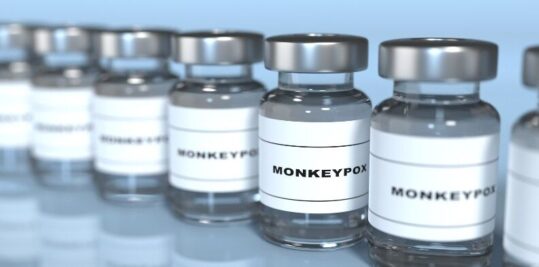At-risk gay and bisexual men should be offered monkeypox vaccine

Some gay and bisexual men at higher risk of exposure to monkeypox should be offered vaccines to help control the recent outbreak of the virus, health officials have recommended.
There have been 793 confirmed cases of monkeypox in the UK, up to 20 June. A vaccination strategy published by the UK Health Security Agency (UKHSA) on 21 June recommends offering the smallpox vaccine Imvanex, which is shown to be effective against monkeypox, to men considered to be at higher risk of exposure.
Monkeypox is not currently defined as a sexually-transmitted infection, but it can be passed on by close and intimate contact that occurs during sex.
UKHSA explained that ‘although anyone can contract monkeypox, data from the latest outbreak shows higher levels of transmission within – but not exclusive to – the sexual networks of gay, bisexual and other men who have sex with men.’
An individual’s eligibility for the vaccine would ‘depend on a number of factors, but would be similar to the criteria used to assess those eligible for HIV pre-exposure prophylaxis (PrEP) – but applied regardless of HIV status,’ UKHSA said.
‘A clinician may advise vaccination for someone who, for example, has multiple partners, participates in group sex or attends “sex on premises” venues.’
Related Article: One in five appointments in general practice completed by a nurse
Health officials warned they are continuing to see ‘a notable proportion of cases’ in gay, bisexual and other men who have sex with men despite ‘extensive contact tracing work’ to help limit the spread of the monkeypox virus.
Dr Mary Ramsay, head of immunisation at UKHSA, explained that ‘by expanding the vaccine offer to those at higher risk, we hope to break chains of transmission and help contain the outbreak.
‘Although most cases are mild, severe illness can occur in some people, so it is important we use the available vaccine to target groups where spread is ongoing.
‘The NHS will soon set out details on how this will be delivered – so do not come forward for the vaccine yet.’
The strategy is endorsed by the UK’s vaccine experts, the Joint Committee on Vaccination and Immunisation.
Alex Sparrowhawk, health promotion specialist at sexual health charity Terrence Higgins Trust, has called the targeted vaccination programme ‘a positive move forward,’ encouraging ‘everyone, regardless of their sexuality, to be vigilant about new spots, ulcers and blisters.’
He said the charity is continuing to closely monitor the latest data in order to ‘play our part in providing the latest guidance and health information on monkeypox, to empower the communities most affected to best protect their health.’
Robbie de Santos, from Stonewall, said the LGBTQ+ rights charity ‘welcomes the vaccine being offered to those gay and bi men who are eligible and currently at a higher risk of getting the virus.’
He said: ‘It is important that gay and bi men get the vaccine when offered to protect themselves and others. Let’s help get the outbreak under control so we can all have a safe and happy pride season.’
Related Article: Nurses joining NMC register later than before
Encouraging people to be vigilant, Dr Ramsay said: ‘Everyone should continue to be alert to any new spots, ulcers or blisters on any part of their body, particularly if they’ve had close contact with a new partner. If you think you have these symptoms, avoid close contact with others and call NHS 111 or your local sexual health centre, though please phone ahead before attending.’
Read more from Nursing in Practice and the RCN on what nurses need to know about monkeypox here.
Monkeypox is a zoonotic infection, caused by the monkeypox virus, that occurs mostly in West and Central Africa.
Cases of monkeypox infection were confirmed in England from 6 May.
Of the 793 confirmed cases of monkeypox in the UK, 766 were in England – the vast majority in London, 18 in Scotland, six in Wales and three in Northern Ireland.
For confirmed cases in the UK, where gender information was available, 758 (99%) confirmed cases were male, with five confirmed female cases. The median age of confirmed cases in the UK was 37 years.
Related Article: Nurse pay over £8k lower due to decade of pay cuts, RCN suggests
UKHSA is now publishing a data report on monkeypox in the UK every Tuesday and Friday.

See how our symptom tool can help you make better sense of patient presentations
Click here to search a symptom




